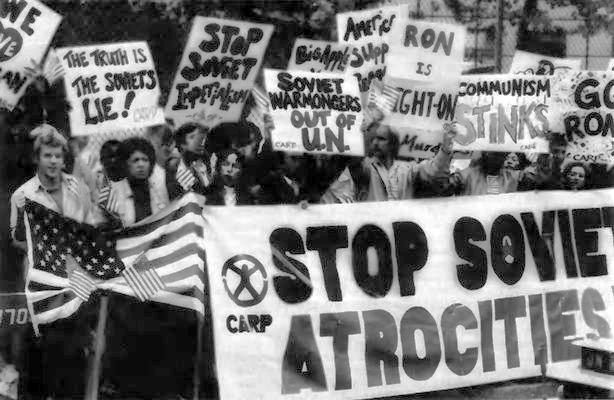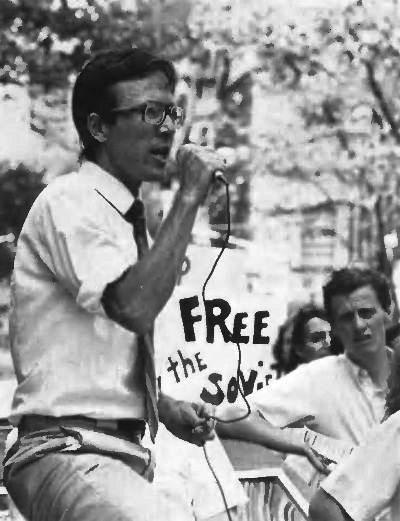![]()
The Words of the Moffitt Family
|
|
The Words of the Moffitt Family |

"At first I did not understand
why our group had been selected to visit Russia, since we were
already 'hard liners' regarding the communist system. But after a few
days of intimidation and Soviet propaganda, and twelve days of
observation, it was abundantly clear to us that our mission was a
success. There is absolutely no substitute for firsthand experience.
We now speak and write with more authority and command the attention
of our audiences more forcefully."
Marylin Atwood
Washington
Bureau Chief
The Anchorage Times
The statement above, written in a thank you letter following our return to the United States, is typical of the comments offered by the 21 participants (mostly members of the media) of the World Media Conference's Opinion Leaders Tour of Soviet Russia.
Among those on the tour were James Whelan, Editor and Publisher of The Washington Times, who acted as the host. We also had the Editor of the Toronto Sun, a White House aide, the Executive Director of the U.S. Global Strategy Council, an editor from conservative American Spectator magazine, a Sovietologist who spoke fluent Russian, two Moonie filmmakers, an ordinary Moonie and others.
The best indication of how the Soviets think was demonstrated when we crossed the border by train from Helsinki to Leningrad. The border guards are uniformed KGB and they only asked us one question: Are you carrying any books or papers? They didn't ask if we had guns or cocaine or dirty pictures, because they are not afraid of those things. But the Soviet Union is deathly afraid of ideas. I don't know why this surprised me because it is quite logical that a country founded on completely false realities would be most threatened by truth.
So they confiscated some of our books. They got Whelan's copy of The Russians by Hedrick Smith and a few others. They have even been known to confiscate harmless travel guidebooks. Then they asked us to sign receipts saying it was okay for them to take our literature. Fortunately, their knowledge of English didn't include the kind of vocabulary needed to fully understand our replies to this request. But they got the general idea. We were in the Soviet Union and they were beginning to notice us.
Several members of the group came with names and addresses of Russian citizens (and toys for the kids) whose relatives lived in the United States. One of our people got some real strange looks from the customs official when he came into the country with a large toy pony in his arms.
From the Soviet point of view, the idea behind tourism is to sell tours and souvenirs in exchange for dollars, francs, German marks and other "hard currency" that can be exchanged in world trade. The Russian ruble is worth almost nothing to the rest of the world. They have found a way to get maximum tourist dollars while controlling the movements of the tourists to an amazing degree, limiting their contact with average Russian citizens to those hand-picked few whose profession is to keep up the facade that the Soviet Union is heaven on earth. Therefore, you never meet an "average" Russian citizen unless you do what we did a lot of: leave the tour, get on the subway and ride.

The real people of Russia are friendly and genuinely attracted to Americans, despite an initial uneasiness due to the bombardment of propaganda heaped upon them daily, comparing Americans to Nazis. Still, a pack of Marlboros or chewing gum can crumble 60 years of anti-American feelings in a matter of minutes, so one gets the impression that the Russian people are also accustomed to disbelieving nearly everything they hear from the Kremlin.
"Everything seems to get worse every year," said one person. "I cannot imagine the future ever improving." The idea that Reagan might be re-elected generally threw people into despair, because they said it would cause their own government to put more money into the military and cause an increase in rationing and economic hardship. When the Cold War is in full swing, it is the Russian people, not the leaders or the military, who suffer.
The more people suffer, the more the Kremlin tells them everything is wonderful, and the more they pretend to believe in order to keep their jobs. Every level of official society is built on a foundation of eggshell-thin lies. But privately, well, that's another story. For example, we saw a great deal of construction going on, with construction cranes sticking up all over the skyline. But we never saw them moving or lifting, even during work days. Early in the tour, I offered a bottle of champagne to the first person to spot a crane actually doing work. Watching cranes became the running joke of the tour, but I never had to pay up. The Soviet Union is indeed a workers' paradise because nobody seems to work.
One reporter on the tour compared the Soviet Union to Coney Island. "As with Coney Island," he said, "there is a tremendous sense of make-believe. The difference is that on Coney Island the rides work."
During the tour, we met with delegations from Pravda and Izvestia newspapers and TASS and Novosti news agencies. Each session was almost the same, with us facing a table of stone faces, who neither gave an inch nor gave the United States credit for having even the smallest good intention. But our group was well- researched and to their credit, didn't give an inch either. Several times, one of the journalists would cite some fact that would make a complete lie out of an elaborate piece of rhetoric one of the Soviet "journalists" had spent the previous half hour constructing. When this happened the Soviet man would merely fall silent for a second while a comrade began speaking on a different topic. These sessions were like a four- year college course in Soviet Studies.
One Saturday night in Odessa, the journalists all suddenly decided they were devoutly religious and demanded the addresses of a synagogue, a Catholic church, a Baptist church and a Russian Orthodox church. Galena, our permanent guide (guard), came up with the addresses, including a phony address for the Baptist church. A few of us set out after dinner Saturday night to locate the churches and were able to find the Baptist church so we could go directly to it the next morning.
Four of us visited the Baptist service and found it to be the only place we really felt the presence of God in the Soviet Union. People begin arriving two hours before the service to pray. When the church fills up wall-to- wall, even elderly ladies stand in the center aisle for the entire two and a half hour service. Almost the whole congregation was in tears from the beginning to the end of the service, including the many young people present. Religion is a strong, though somewhat underground force, and it is with good reason that the government feels so threatened by religion. Religion will destroy the Soviet Government.
While in Moscow, the three Unification Church members on the staff held the first formation-stage Moscow Rally at the foot of the Kremlin Wall. Trying to be as casual as we could, we propped up the movie camera on the ground and set up a small sound recorder. We sat in a circle around the microphone and sang "Song of the Garden." Then we prayed for God to prepare the way for Father to come to Moscow. We prayed for the liberation of the Russian people and asked Heavenly Father to make this ground a special place where people could come to pray and feel new hope and determination to rid their country of communism.
After the rally, observed by one uniformed KGB officer who didn't interfere, we felt ecstatic with joy. We left the area talking about where we should set up the stage and the seats and lights for the next rally. Suddenly it seemed possible and so very real that Father and Mother would stand here and the flags of all the nations would be lined up like so, and the people would sit in this section and some over there. And the band would play "Song of the Garden."